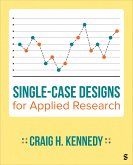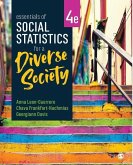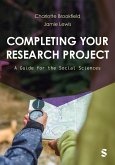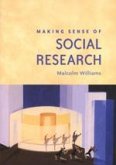James Marlatt, Jeremy J. Shapiro, Luann Drolc Fortune, Valerie Malhotra Bentz
Mindful Inquiry in Social Research
James Marlatt, Jeremy J. Shapiro, Luann Drolc Fortune, Valerie Malhotra Bentz
Mindful Inquiry in Social Research
- Broschiertes Buch
- Merkliste
- Auf die Merkliste
- Bewerten Bewerten
- Teilen
- Produkt teilen
- Produkterinnerung
- Produkterinnerung
An updated edition of the bestselling text broadens the conception of mindfulness, and shows how mindful inquirers can maximize positive outcomes for participants, organizations, communities, and themselves. The first five chapters describe the application of mindful inquiry, and the following nine introduce cultures of inquiry and research traditions, theories, methods, and techniques.
Andere Kunden interessierten sich auch für
![Single-Case Designs for Applied Research Single-Case Designs for Applied Research]() Craig H. KennedySingle-Case Designs for Applied Research98,99 €
Craig H. KennedySingle-Case Designs for Applied Research98,99 €![Essentials of Social Statistics for a Diverse Society Essentials of Social Statistics for a Diverse Society]() Anna Leon-GuerreroEssentials of Social Statistics for a Diverse Society161,99 €
Anna Leon-GuerreroEssentials of Social Statistics for a Diverse Society161,99 €![Completing Your Research Project Completing Your Research Project]() Charlotte BrookfieldCompleting Your Research Project30,99 €
Charlotte BrookfieldCompleting Your Research Project30,99 €![Making Sense of Social Research Making Sense of Social Research]() Malcolm WilliamsMaking Sense of Social Research76,99 €
Malcolm WilliamsMaking Sense of Social Research76,99 €![Philosophy and Methodology of the Social Sciences Philosophy and Methodology of the Social Sciences]() Mark J SmithPhilosophy and Methodology of the Social Sciences1.285,99 €
Mark J SmithPhilosophy and Methodology of the Social Sciences1.285,99 €![The Information The Information]() James GleickThe Information18,99 €
James GleickThe Information18,99 €![The Carpenter's And Joiner's Handbook The Carpenter's And Joiner's Handbook]() Henry Wells HollyThe Carpenter's And Joiner's Handbook13,99 €
Henry Wells HollyThe Carpenter's And Joiner's Handbook13,99 €-
-
-
An updated edition of the bestselling text broadens the conception of mindfulness, and shows how mindful inquirers can maximize positive outcomes for participants, organizations, communities, and themselves. The first five chapters describe the application of mindful inquiry, and the following nine introduce cultures of inquiry and research traditions, theories, methods, and techniques.
Hinweis: Dieser Artikel kann nur an eine deutsche Lieferadresse ausgeliefert werden.
Hinweis: Dieser Artikel kann nur an eine deutsche Lieferadresse ausgeliefert werden.
Produktdetails
- Produktdetails
- Verlag: Sage Publications Inc Ebooks
- 2 Revised edition
- Erscheinungstermin: 14. Juli 2025
- Englisch
- Abmessung: 228mm x 152mm
- ISBN-13: 9781071920671
- ISBN-10: 1071920677
- Artikelnr.: 72878493
- Herstellerkennzeichnung
- Libri GmbH
- Europaallee 1
- 36244 Bad Hersfeld
- gpsr@libri.de
- Verlag: Sage Publications Inc Ebooks
- 2 Revised edition
- Erscheinungstermin: 14. Juli 2025
- Englisch
- Abmessung: 228mm x 152mm
- ISBN-13: 9781071920671
- ISBN-10: 1071920677
- Artikelnr.: 72878493
- Herstellerkennzeichnung
- Libri GmbH
- Europaallee 1
- 36244 Bad Hersfeld
- gpsr@libri.de
Valerie Malhotra Bentz, Ph.D., MSSW is Professor, School of Leadership Studies, Fielding Graduate University, having served as Associate Dean for Research. Her interests include phenomenology, somatics, social theory, consciousness development, contemplative research and Vedantic knowledge. She is engaged in collaborative research leading to publications such as: Deathworlds to Lifeworlds: Collaboration with Strangers for Personal, Social and Ecological Transformation, (with James Marlatt); Handbook of Transformative Phenomenology (with James Marlatt) Expressions of Phenomenological Research (with David Rehorick); Contemplative Social Research (with Vincenzo Giorgino); Transformative Phenomenology (with David Rehorick). She is the author of Becoming Mature: Childhood Ghosts and Spirits in Adult Life and a philosophical novel, Flesh and Mind: The Time Travels of Dr. Victoria Von Dietz. Valerie directs the Doctoral Concentration in Somatics, Phenomenology and Communicative Leadership (SPCL) and co-founded the concentration in Creative Longevity and Wisdom. She is an experienced psychotherapist, yoga teacher, massage therapist, environmental activist and musician.
Preface
About the Authors
Introduction
Chapter 1: The 21st Century Context and a New Approach
Putting the Person at the Center
Mindful Inquiry: Our Philosophy
Who is the Researcher?
Multiplicity of Approaches, Cultures of Inquiry
Becoming a Researcher as Socialization into a Community
Building Caring Communities Through Mindful Inquiry
Mode of Serious Play
Conclusion
Chapter 2: The Mindful Inquirer as Philosopher: From Positivism/Scientism
to Postmodernism and Beyond
The Researcher as Applied Philosopher
The Mysterious Death and Afterlife of Positivism
The Postmodern Situation and the Crisis in the Foundations of Knowledge
Living at a Historical Turning Point: Forms of Posthumanism or the Global
Context of Research
Post-Truth and Fake News
Mindful Inquiry and the Way Forward: Alternative Epistemologies to
Scientism/Positivism
Conclusion
Chapter 3: Mindful Inquiry as the Basis for Scholarly Practice
Four Knowledge Traditions
Mindful Inquiry as Contemplative Embodied Critical Hermeneutic
Phenomenology
Summary
The Spiral of Mindful Inquiry
Beyond Research Ethics to Mindful Inquiry
The Affinity of Mindful Inquiry to Non-Western Thought
Summary
Chapter 4: Fundamentals of Mindful Inquiry
Fundamentals for Authenticity
Experiment and Typification in Everyday Life and Social Inquiry
Assessments, Tests, and Measurements: Developing Types
Journalism Versus Social Science: Linking Theory and Research
Conclusion
Chapter 5: The Mindful Scholar-Practitioner
The Role of the Scholar-Practitioner
Misappropriation and Mindful Inquiry
Functions and Qualities of the Scholar-Practitioner
Examples of Scholar-Practitioner Inquiry
Research as Collaboration with a Community of Research & Practice (CORP)
Becoming a Scholar-Practitioner
Assessing Your Growing Competency as a Researcher
What Makes Something Count as Knowledge?
Gaining Mastery of Research Competencies to Maximize Creativity as a
Researcher
Chapter 6: Cultures of Inquiry and Research Traditions
Disciplines, Cultures of Inquiry, Theories, Methods, and Techniques
Situating Yourself Within Research Traditions
Looking at Cultures of Inquiry
Chapter 7: Contemplative Embodied Awareness
Somatics or Embodied Awareness
Somatic (Embodied) Inquiry
Somatics and Research Process
Somatics and Social Justice
Limitations and Challenges
Contemplative Inquiry
Chapter 8: Phenomenological Inquiry
Typical Problems and Concerns
The Raw Data of Phenomenological Research
Phenomenological Methods of Gaining Understanding
The Nature of Explanation and the Nature of Knowledge
The Necessity and Centrality of the Phenomenological Reduction
Relationship Between Researcher and Subject Matter
Critique of Phenomenology
Chapter 9: Hermeneutic Inquiry, Ethnography, and Narrative Research
Hermeneutics
Strategies for Analyzing Texts
Typical Problems and Concerns
The Raw Data of Hermeneutic Research
Hermeneutic Methods of Gaining Understanding
The Nature of Explanation and the Nature of Knowledge
Relationship Between Researcher and Subject Matter
Deep Hermeneutics of Heidegger and Gadamer
Ethnography
Typical Problems and Concerns
The Nature of Explanation and the Nature of Knowledge
Relationship Between Researcher and Subject Matter
A Note on Autoethnography
Conclusion
Chapter 10: Quantitative, Behavioral, Evaluation, Mixed, and Multi-Phased
Research
Orientation to Quantitative and Behavioral Science Research
Typical Problems and Concerns
The Nature of Explanation and the Nature of Knowledge
Relationship Between Researcher and Subject Matter
Orientation to Evaluation Research
Typical Problems and Concerns
The Nature of Explanation and the Nature of Knowledge
Relationship Between Researcher and Subject Matter
Orientation to Mixed Methods Research
Typical Problems and Concerns
The Nature of Explanation
Relationship Between Researcher and Subject Matter
Multiphased Research Focused on Areas of Public Concern
Conclusion
Chapter 11: Comparative-Historical Inquiry, Theoretical Inquiry, and
Grounded Theory
Orientation to Comparative-Historical Inquiry
Typical Problems and Concerns
Relationship Between Researcher and Subject Matter
Orientation to Theoretical Inquiry
Typical Problems and Concerns
Relationship Between Researcher and Subject Matter
Chapter 12: Critical Theory and Critical Social Theory
Orientation to Critical Social Science
Some Historical Notes on Critical Social Science
Origins and Implications of the Frankfurt School of Critical Theory
Thinkers That Followed the Pathway
Implications for Problems of Today
Typical Problems and Concerns
The Nature of Explanation and the Nature of Knowledge
Relationship Between Researcher and Subject Matter
A Note on Intersectionality and Mindful Inquiry
Chapter 13: Action Research and Indigenous Research
Origins, Typical Problems and Concerns
The Nature of Explanation and the Nature of Knowledge
The Action Research Family
Indigenous Research
Conclusion
Chapter 14: Conclusion and Magic Formulae
Magic Formulae
Intend to Learn
Surrender and Catch
Conjecture and Refute
To the Things Themselves
Let Everything Human Be Spoken to You
Regard All Things as They Present Themselves From the Standpoint of
Redemption
Cultivate a Boundless Heart Toward All Beings
Cultivate Contemplative Embodied Awareness
Summary
Appendix A: Glossary
Appendix B: Research Competencies
Appendix C: Key Ideas of Positivism/Scientism
Appendix D: Introductory Reading List
References
Index
About the Authors
Introduction
Chapter 1: The 21st Century Context and a New Approach
Putting the Person at the Center
Mindful Inquiry: Our Philosophy
Who is the Researcher?
Multiplicity of Approaches, Cultures of Inquiry
Becoming a Researcher as Socialization into a Community
Building Caring Communities Through Mindful Inquiry
Mode of Serious Play
Conclusion
Chapter 2: The Mindful Inquirer as Philosopher: From Positivism/Scientism
to Postmodernism and Beyond
The Researcher as Applied Philosopher
The Mysterious Death and Afterlife of Positivism
The Postmodern Situation and the Crisis in the Foundations of Knowledge
Living at a Historical Turning Point: Forms of Posthumanism or the Global
Context of Research
Post-Truth and Fake News
Mindful Inquiry and the Way Forward: Alternative Epistemologies to
Scientism/Positivism
Conclusion
Chapter 3: Mindful Inquiry as the Basis for Scholarly Practice
Four Knowledge Traditions
Mindful Inquiry as Contemplative Embodied Critical Hermeneutic
Phenomenology
Summary
The Spiral of Mindful Inquiry
Beyond Research Ethics to Mindful Inquiry
The Affinity of Mindful Inquiry to Non-Western Thought
Summary
Chapter 4: Fundamentals of Mindful Inquiry
Fundamentals for Authenticity
Experiment and Typification in Everyday Life and Social Inquiry
Assessments, Tests, and Measurements: Developing Types
Journalism Versus Social Science: Linking Theory and Research
Conclusion
Chapter 5: The Mindful Scholar-Practitioner
The Role of the Scholar-Practitioner
Misappropriation and Mindful Inquiry
Functions and Qualities of the Scholar-Practitioner
Examples of Scholar-Practitioner Inquiry
Research as Collaboration with a Community of Research & Practice (CORP)
Becoming a Scholar-Practitioner
Assessing Your Growing Competency as a Researcher
What Makes Something Count as Knowledge?
Gaining Mastery of Research Competencies to Maximize Creativity as a
Researcher
Chapter 6: Cultures of Inquiry and Research Traditions
Disciplines, Cultures of Inquiry, Theories, Methods, and Techniques
Situating Yourself Within Research Traditions
Looking at Cultures of Inquiry
Chapter 7: Contemplative Embodied Awareness
Somatics or Embodied Awareness
Somatic (Embodied) Inquiry
Somatics and Research Process
Somatics and Social Justice
Limitations and Challenges
Contemplative Inquiry
Chapter 8: Phenomenological Inquiry
Typical Problems and Concerns
The Raw Data of Phenomenological Research
Phenomenological Methods of Gaining Understanding
The Nature of Explanation and the Nature of Knowledge
The Necessity and Centrality of the Phenomenological Reduction
Relationship Between Researcher and Subject Matter
Critique of Phenomenology
Chapter 9: Hermeneutic Inquiry, Ethnography, and Narrative Research
Hermeneutics
Strategies for Analyzing Texts
Typical Problems and Concerns
The Raw Data of Hermeneutic Research
Hermeneutic Methods of Gaining Understanding
The Nature of Explanation and the Nature of Knowledge
Relationship Between Researcher and Subject Matter
Deep Hermeneutics of Heidegger and Gadamer
Ethnography
Typical Problems and Concerns
The Nature of Explanation and the Nature of Knowledge
Relationship Between Researcher and Subject Matter
A Note on Autoethnography
Conclusion
Chapter 10: Quantitative, Behavioral, Evaluation, Mixed, and Multi-Phased
Research
Orientation to Quantitative and Behavioral Science Research
Typical Problems and Concerns
The Nature of Explanation and the Nature of Knowledge
Relationship Between Researcher and Subject Matter
Orientation to Evaluation Research
Typical Problems and Concerns
The Nature of Explanation and the Nature of Knowledge
Relationship Between Researcher and Subject Matter
Orientation to Mixed Methods Research
Typical Problems and Concerns
The Nature of Explanation
Relationship Between Researcher and Subject Matter
Multiphased Research Focused on Areas of Public Concern
Conclusion
Chapter 11: Comparative-Historical Inquiry, Theoretical Inquiry, and
Grounded Theory
Orientation to Comparative-Historical Inquiry
Typical Problems and Concerns
Relationship Between Researcher and Subject Matter
Orientation to Theoretical Inquiry
Typical Problems and Concerns
Relationship Between Researcher and Subject Matter
Chapter 12: Critical Theory and Critical Social Theory
Orientation to Critical Social Science
Some Historical Notes on Critical Social Science
Origins and Implications of the Frankfurt School of Critical Theory
Thinkers That Followed the Pathway
Implications for Problems of Today
Typical Problems and Concerns
The Nature of Explanation and the Nature of Knowledge
Relationship Between Researcher and Subject Matter
A Note on Intersectionality and Mindful Inquiry
Chapter 13: Action Research and Indigenous Research
Origins, Typical Problems and Concerns
The Nature of Explanation and the Nature of Knowledge
The Action Research Family
Indigenous Research
Conclusion
Chapter 14: Conclusion and Magic Formulae
Magic Formulae
Intend to Learn
Surrender and Catch
Conjecture and Refute
To the Things Themselves
Let Everything Human Be Spoken to You
Regard All Things as They Present Themselves From the Standpoint of
Redemption
Cultivate a Boundless Heart Toward All Beings
Cultivate Contemplative Embodied Awareness
Summary
Appendix A: Glossary
Appendix B: Research Competencies
Appendix C: Key Ideas of Positivism/Scientism
Appendix D: Introductory Reading List
References
Index
Preface
About the Authors
Introduction
Chapter 1: The 21st Century Context and a New Approach
Putting the Person at the Center
Mindful Inquiry: Our Philosophy
Who is the Researcher?
Multiplicity of Approaches, Cultures of Inquiry
Becoming a Researcher as Socialization into a Community
Building Caring Communities Through Mindful Inquiry
Mode of Serious Play
Conclusion
Chapter 2: The Mindful Inquirer as Philosopher: From Positivism/Scientism
to Postmodernism and Beyond
The Researcher as Applied Philosopher
The Mysterious Death and Afterlife of Positivism
The Postmodern Situation and the Crisis in the Foundations of Knowledge
Living at a Historical Turning Point: Forms of Posthumanism or the Global
Context of Research
Post-Truth and Fake News
Mindful Inquiry and the Way Forward: Alternative Epistemologies to
Scientism/Positivism
Conclusion
Chapter 3: Mindful Inquiry as the Basis for Scholarly Practice
Four Knowledge Traditions
Mindful Inquiry as Contemplative Embodied Critical Hermeneutic
Phenomenology
Summary
The Spiral of Mindful Inquiry
Beyond Research Ethics to Mindful Inquiry
The Affinity of Mindful Inquiry to Non-Western Thought
Summary
Chapter 4: Fundamentals of Mindful Inquiry
Fundamentals for Authenticity
Experiment and Typification in Everyday Life and Social Inquiry
Assessments, Tests, and Measurements: Developing Types
Journalism Versus Social Science: Linking Theory and Research
Conclusion
Chapter 5: The Mindful Scholar-Practitioner
The Role of the Scholar-Practitioner
Misappropriation and Mindful Inquiry
Functions and Qualities of the Scholar-Practitioner
Examples of Scholar-Practitioner Inquiry
Research as Collaboration with a Community of Research & Practice (CORP)
Becoming a Scholar-Practitioner
Assessing Your Growing Competency as a Researcher
What Makes Something Count as Knowledge?
Gaining Mastery of Research Competencies to Maximize Creativity as a
Researcher
Chapter 6: Cultures of Inquiry and Research Traditions
Disciplines, Cultures of Inquiry, Theories, Methods, and Techniques
Situating Yourself Within Research Traditions
Looking at Cultures of Inquiry
Chapter 7: Contemplative Embodied Awareness
Somatics or Embodied Awareness
Somatic (Embodied) Inquiry
Somatics and Research Process
Somatics and Social Justice
Limitations and Challenges
Contemplative Inquiry
Chapter 8: Phenomenological Inquiry
Typical Problems and Concerns
The Raw Data of Phenomenological Research
Phenomenological Methods of Gaining Understanding
The Nature of Explanation and the Nature of Knowledge
The Necessity and Centrality of the Phenomenological Reduction
Relationship Between Researcher and Subject Matter
Critique of Phenomenology
Chapter 9: Hermeneutic Inquiry, Ethnography, and Narrative Research
Hermeneutics
Strategies for Analyzing Texts
Typical Problems and Concerns
The Raw Data of Hermeneutic Research
Hermeneutic Methods of Gaining Understanding
The Nature of Explanation and the Nature of Knowledge
Relationship Between Researcher and Subject Matter
Deep Hermeneutics of Heidegger and Gadamer
Ethnography
Typical Problems and Concerns
The Nature of Explanation and the Nature of Knowledge
Relationship Between Researcher and Subject Matter
A Note on Autoethnography
Conclusion
Chapter 10: Quantitative, Behavioral, Evaluation, Mixed, and Multi-Phased
Research
Orientation to Quantitative and Behavioral Science Research
Typical Problems and Concerns
The Nature of Explanation and the Nature of Knowledge
Relationship Between Researcher and Subject Matter
Orientation to Evaluation Research
Typical Problems and Concerns
The Nature of Explanation and the Nature of Knowledge
Relationship Between Researcher and Subject Matter
Orientation to Mixed Methods Research
Typical Problems and Concerns
The Nature of Explanation
Relationship Between Researcher and Subject Matter
Multiphased Research Focused on Areas of Public Concern
Conclusion
Chapter 11: Comparative-Historical Inquiry, Theoretical Inquiry, and
Grounded Theory
Orientation to Comparative-Historical Inquiry
Typical Problems and Concerns
Relationship Between Researcher and Subject Matter
Orientation to Theoretical Inquiry
Typical Problems and Concerns
Relationship Between Researcher and Subject Matter
Chapter 12: Critical Theory and Critical Social Theory
Orientation to Critical Social Science
Some Historical Notes on Critical Social Science
Origins and Implications of the Frankfurt School of Critical Theory
Thinkers That Followed the Pathway
Implications for Problems of Today
Typical Problems and Concerns
The Nature of Explanation and the Nature of Knowledge
Relationship Between Researcher and Subject Matter
A Note on Intersectionality and Mindful Inquiry
Chapter 13: Action Research and Indigenous Research
Origins, Typical Problems and Concerns
The Nature of Explanation and the Nature of Knowledge
The Action Research Family
Indigenous Research
Conclusion
Chapter 14: Conclusion and Magic Formulae
Magic Formulae
Intend to Learn
Surrender and Catch
Conjecture and Refute
To the Things Themselves
Let Everything Human Be Spoken to You
Regard All Things as They Present Themselves From the Standpoint of
Redemption
Cultivate a Boundless Heart Toward All Beings
Cultivate Contemplative Embodied Awareness
Summary
Appendix A: Glossary
Appendix B: Research Competencies
Appendix C: Key Ideas of Positivism/Scientism
Appendix D: Introductory Reading List
References
Index
About the Authors
Introduction
Chapter 1: The 21st Century Context and a New Approach
Putting the Person at the Center
Mindful Inquiry: Our Philosophy
Who is the Researcher?
Multiplicity of Approaches, Cultures of Inquiry
Becoming a Researcher as Socialization into a Community
Building Caring Communities Through Mindful Inquiry
Mode of Serious Play
Conclusion
Chapter 2: The Mindful Inquirer as Philosopher: From Positivism/Scientism
to Postmodernism and Beyond
The Researcher as Applied Philosopher
The Mysterious Death and Afterlife of Positivism
The Postmodern Situation and the Crisis in the Foundations of Knowledge
Living at a Historical Turning Point: Forms of Posthumanism or the Global
Context of Research
Post-Truth and Fake News
Mindful Inquiry and the Way Forward: Alternative Epistemologies to
Scientism/Positivism
Conclusion
Chapter 3: Mindful Inquiry as the Basis for Scholarly Practice
Four Knowledge Traditions
Mindful Inquiry as Contemplative Embodied Critical Hermeneutic
Phenomenology
Summary
The Spiral of Mindful Inquiry
Beyond Research Ethics to Mindful Inquiry
The Affinity of Mindful Inquiry to Non-Western Thought
Summary
Chapter 4: Fundamentals of Mindful Inquiry
Fundamentals for Authenticity
Experiment and Typification in Everyday Life and Social Inquiry
Assessments, Tests, and Measurements: Developing Types
Journalism Versus Social Science: Linking Theory and Research
Conclusion
Chapter 5: The Mindful Scholar-Practitioner
The Role of the Scholar-Practitioner
Misappropriation and Mindful Inquiry
Functions and Qualities of the Scholar-Practitioner
Examples of Scholar-Practitioner Inquiry
Research as Collaboration with a Community of Research & Practice (CORP)
Becoming a Scholar-Practitioner
Assessing Your Growing Competency as a Researcher
What Makes Something Count as Knowledge?
Gaining Mastery of Research Competencies to Maximize Creativity as a
Researcher
Chapter 6: Cultures of Inquiry and Research Traditions
Disciplines, Cultures of Inquiry, Theories, Methods, and Techniques
Situating Yourself Within Research Traditions
Looking at Cultures of Inquiry
Chapter 7: Contemplative Embodied Awareness
Somatics or Embodied Awareness
Somatic (Embodied) Inquiry
Somatics and Research Process
Somatics and Social Justice
Limitations and Challenges
Contemplative Inquiry
Chapter 8: Phenomenological Inquiry
Typical Problems and Concerns
The Raw Data of Phenomenological Research
Phenomenological Methods of Gaining Understanding
The Nature of Explanation and the Nature of Knowledge
The Necessity and Centrality of the Phenomenological Reduction
Relationship Between Researcher and Subject Matter
Critique of Phenomenology
Chapter 9: Hermeneutic Inquiry, Ethnography, and Narrative Research
Hermeneutics
Strategies for Analyzing Texts
Typical Problems and Concerns
The Raw Data of Hermeneutic Research
Hermeneutic Methods of Gaining Understanding
The Nature of Explanation and the Nature of Knowledge
Relationship Between Researcher and Subject Matter
Deep Hermeneutics of Heidegger and Gadamer
Ethnography
Typical Problems and Concerns
The Nature of Explanation and the Nature of Knowledge
Relationship Between Researcher and Subject Matter
A Note on Autoethnography
Conclusion
Chapter 10: Quantitative, Behavioral, Evaluation, Mixed, and Multi-Phased
Research
Orientation to Quantitative and Behavioral Science Research
Typical Problems and Concerns
The Nature of Explanation and the Nature of Knowledge
Relationship Between Researcher and Subject Matter
Orientation to Evaluation Research
Typical Problems and Concerns
The Nature of Explanation and the Nature of Knowledge
Relationship Between Researcher and Subject Matter
Orientation to Mixed Methods Research
Typical Problems and Concerns
The Nature of Explanation
Relationship Between Researcher and Subject Matter
Multiphased Research Focused on Areas of Public Concern
Conclusion
Chapter 11: Comparative-Historical Inquiry, Theoretical Inquiry, and
Grounded Theory
Orientation to Comparative-Historical Inquiry
Typical Problems and Concerns
Relationship Between Researcher and Subject Matter
Orientation to Theoretical Inquiry
Typical Problems and Concerns
Relationship Between Researcher and Subject Matter
Chapter 12: Critical Theory and Critical Social Theory
Orientation to Critical Social Science
Some Historical Notes on Critical Social Science
Origins and Implications of the Frankfurt School of Critical Theory
Thinkers That Followed the Pathway
Implications for Problems of Today
Typical Problems and Concerns
The Nature of Explanation and the Nature of Knowledge
Relationship Between Researcher and Subject Matter
A Note on Intersectionality and Mindful Inquiry
Chapter 13: Action Research and Indigenous Research
Origins, Typical Problems and Concerns
The Nature of Explanation and the Nature of Knowledge
The Action Research Family
Indigenous Research
Conclusion
Chapter 14: Conclusion and Magic Formulae
Magic Formulae
Intend to Learn
Surrender and Catch
Conjecture and Refute
To the Things Themselves
Let Everything Human Be Spoken to You
Regard All Things as They Present Themselves From the Standpoint of
Redemption
Cultivate a Boundless Heart Toward All Beings
Cultivate Contemplative Embodied Awareness
Summary
Appendix A: Glossary
Appendix B: Research Competencies
Appendix C: Key Ideas of Positivism/Scientism
Appendix D: Introductory Reading List
References
Index








